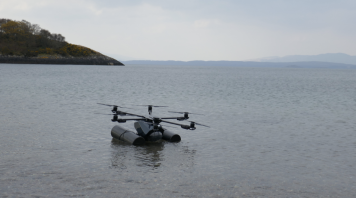Development of instruments and algorithms for satellite remote sensing of plastics need standardised global in-situ observations. Compared to aquatic environments, dry shorelines are more accessible to frequent in situ observations. We propose to develop a standardised indicator for in-situ radiometric detection of plastic debris with the view to be deployed globally on different platforms including handheld and unmanned aircraft. Plymouth Marine Laboratory (PML) and the Scottish Association for Marine Science (SAMS) propose a field campaign to collect radiometric data of the quality required for satellite validation, meeting traceability and uncertainty budget criteria. Little work has been done in this regard to date. Field hyperspectral spectrometers (e.g. ASD) and hyperspectral imagers (including BaySpec OCI-F) will be deployed in hand-held mode and on drones. Spectra from different plastic types, organic carbon based material and non-litter plastics will be collected in distinctive cases: rocky shore and sandy beach. Using an atmospheric radiative transfer model, we will simulate at-satellite sensor radiances to provide guidance on sensor requirements as well as model signal unmixing for retrieval of plastic pixel coverage. We will assess how the Sentinel-2 MSI and hyperspectral missions (e.g. PRISMA) perform in this scenario, and plan satellite matchups with in situ observations where feasible. The quantification of plastic debris based on radiometric quantities related to the chemical composition of marine plastic debris has been undertaken by previous work including the ESA funded OPTIMAL feasibility study as a potential basis for a global indicator. Chemical composition will also be checked using the industry-standard, lab-based Fourier Transform Infra-Red (FTIR) spectrometer available at SAMS. By working in this direction, this work contributes to the wider measurement standarisation efforts towards global integrated marine debris observing system

